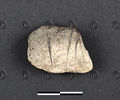NO-5: Difference between revisions
Sindy Kluge (talk | contribs) No edit summary |
Sindy Kluge (talk | contribs) No edit summary |
||
| Line 22: | Line 22: | ||
First published in {{bib|Pauli 1888}}: 144 ff. Autopsied by TIR in October 2014. | First published in {{bib|Pauli 1888}}: 144 ff. Autopsied by TIR in October 2014. | ||
Images in {{bib|Pauli 1888}}: Tav. II,3 (drawing), Mayr 1957: Abb. 2 (photo), {{bib|LIR}} (drawing). | Images in {{bib|Pauli 1888}}: Tav. II,3 (drawing), {{bib|Mayr 1957}}: Abb. 2 (photo), {{bib|LIR}} (drawing). | ||
Dextroverse {{c||A|d}} on the right is clearly identifiable depite the missing top. The hasta to its left is slightly oblique. {{bib|Pauli 1888|Pauli}} read {{c||Φ}}, {{bib|PID|Whatmough}} suggested {{c||R|d}}, but in fact not even traces of bars can be verified. If anything, the straight breaking edge to the right of the hasta's top allows for a bar {{c||line d 20}}, yielding {{c||P2}}. The straight breaking edge on the left of the fragment may follow a hasta. {{bib|LIR|Mancini}} compares {{w||φausuθ}} on [[index::NO-7]], but note that the object is most certainly a ceramic fragment and not one of bone as assumed by {{bib|Pauli 1888|Pauli}} (for this purpose cp. also the [[index::NO-5 potsherd|page related to the object]]). | Dextroverse {{c||A|d}} on the right is clearly identifiable depite the missing top. The hasta to its left is slightly oblique. {{bib|Pauli 1888|Pauli}} read {{c||Φ}}, {{bib|PID|Whatmough}} suggested {{c||R|d}}, but in fact not even traces of bars can be verified. If anything, the straight breaking edge to the right of the hasta's top allows for a bar {{c||line d 20}}, yielding {{c||P2}}. The straight breaking edge on the left of the fragment may follow a hasta. {{bib|LIR|Mancini}} compares {{w||φausuθ}} on [[index::NO-7]], but note that the object is most certainly a ceramic fragment and not one of bone as assumed by {{bib|Pauli 1888|Pauli}} (for this purpose cp. also the [[index::NO-5 potsherd|page related to the object]]). | ||
Revision as of 14:03, 12 May 2015
| Inscription | |
|---|---|
| Transliteration: | (?)]?a[ |
| Original script: | (?)]? |
|
| |
| Object: | NO-5 potsherd (pottery) |
| Position: | outside |
| Script: | unknown |
| Direction of writing: | ambiguous |
| Letter height: | 2 cm |
| Number of letters: | 2 |
| Number of lines: | 1 |
| Craftsmanship: | incised |
| Current condition: | damaged, fragmentary |
| Archaeological culture: | Late Iron Age [from object] |
| Date of inscription: | 5th–1st centuries BC [from object] |
| Date derived from: | archaeological context, cultural context [from object] |
|
| |
| Language: | unknown |
| Meaning: | unknown |
|
| |
| Alternative sigla: | PID 212 LIR ME-5 |
| Sources: | Schumacher 2004: 151 |
Images
|
Object NO-5 potsherd with inscription NO-5.
|
Commentary
First published in Pauli 1888: 144 ff. Autopsied by TIR in October 2014.
Images in Pauli 1888: Tav. II,3 (drawing), Mayr 1957: Abb. 2 (photo), LIR (drawing).
Dextroverse ![]() on the right is clearly identifiable depite the missing top. The hasta to its left is slightly oblique. Pauli read
on the right is clearly identifiable depite the missing top. The hasta to its left is slightly oblique. Pauli read ![]() , Whatmough suggested
, Whatmough suggested ![]() , but in fact not even traces of bars can be verified. If anything, the straight breaking edge to the right of the hasta's top allows for a bar
, but in fact not even traces of bars can be verified. If anything, the straight breaking edge to the right of the hasta's top allows for a bar ![]() , yielding
, yielding ![]() . The straight breaking edge on the left of the fragment may follow a hasta. Mancini compares φausuθ on NO-7, but note that the object is most certainly a ceramic fragment and not one of bone as assumed by Pauli (for this purpose cp. also the page related to the object).
. The straight breaking edge on the left of the fragment may follow a hasta. Mancini compares φausuθ on NO-7, but note that the object is most certainly a ceramic fragment and not one of bone as assumed by Pauli (for this purpose cp. also the page related to the object).
Further references: NRIE 110, Battisti 1944: 234.
Bibliography
| Battisti 1944 | Carlo Battisti, "Osservazioni sulla lingua delle iscrizioni nell'alfabeto etrusco settentrionale di Bolzano", Studi Etruschi 18 (1944), 199–236. |
|---|---|
| LIR | Alberto Mancini, Le Iscrizioni Retiche [= Quaderni del dipartimento di linguistica, Università degli studi di Firenze Studi 8–9], Padova: Unipress 2009–10. (2 volumes) |
| Mayr 1957 | Karl M. Mayr, "Hirschhornvotive mit rätischen Inschriften aus Meclo (Mechel) am Nonsberg", Der Schlern 31 (1957), 230–231. |
